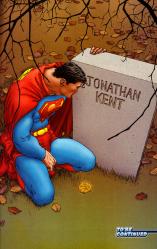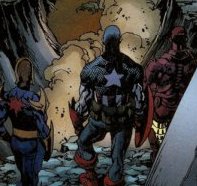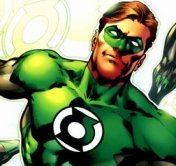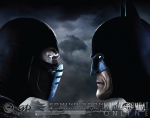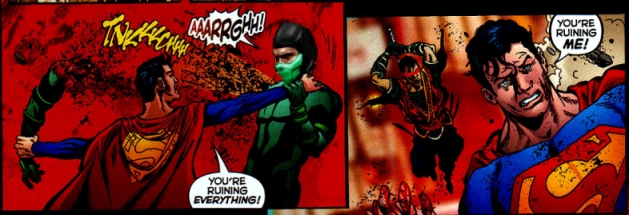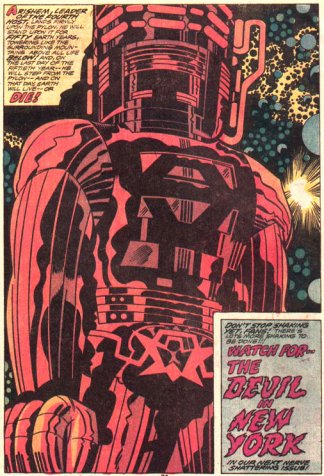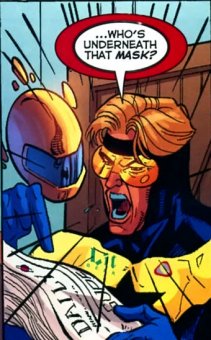Yo, I can’t fully become my mother’s guiding light
’til my dad returns to tell me what the other side is like
I keep the things you taught trapped in mind
I know you cared…
Even though you weren’t here half the time
But who am I to blame?
I’d probably do the same in your shoes
–Copywrite, “June”
Fathers are an important element of a lot of comics characters origins, and I haven’t really seen a lot of attention aimed in that direction. This is odd, because the three biggest comics characters (Super/Spider-/Batman) are orphans with surrogate parents. Superman has Jonathan and Martha Kent, Batman has Alfred, and Spider-Man has Aunt May and Uncle Ben. I’m going to talk about Jonathan Kent, and Ben Parker to a lesser extent, in specific here, I think.
(For what it is worth, Martha, Martha, and May [their supergroup is named 3M and May is lead singer] provided the compassion that fuels all three heroes in their daily interactions with the citizenry. In each case, both parents are vital and equal components of the hero’s heroic persona. That should probably be another post, however.)
I could probably do an essay apiece on these guys, so I’ll take it slow and focus specifically on the treatment of Jonathan Kent in All-Star Superman #6, “Funeral in Smallville.” I find the regular DCU Jonathan interesting, too, especially in light of Adventures of Superman #500, but I’ll get to that later.
Ben’s influence on Peter Parker is two-fold. First, he’s the source of Peter’s superheroic morality. “With great power comes great responsibility” is basically the reason that Spider-Man became a hero, instead of a celebrity. The other angle is that he’s a source of grief and guilt for Peter, providing a secondary reason for him to keep heroing. Ben Parker is, essentially, Peter Parker’s first failure. Gwen and Captain Stacy are two further failures.
Jonathan Kent, in light of this issue, is essentially Ben Parker. In this updated story about Clark Kent’s past, Jonathan is already elderly at this point, and has heart troubles. Three mysterious Supermen appear and attempt to prevent Clark from fighting a Chronovore. Instead, Clark presses on into battle and loses three minutes of his life. In those three minutes, his father suffers a fatal heart attack and dies.



Before this, Clark was essentially invincible. There was nothing he could not do. There was nothing he could fail at. However, his first failure was harsh enough to instill in him a resolution (I’d hesitate to call it a fear) to never fail again.
The scene where Jonathan dies is cut into the fight against the Chronovore, including a rough scene where Clark is flying so fast that his hair ignites while he screams that he can “save everybody.” The scene directly after that is the funeral, which explains the moral fiber that Jonathan instilled in his son.
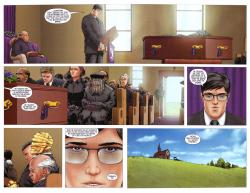
“Jonathan Kent taught me that the
strong have to stand up for the weak and that bullies don’t like being bullied
back. […] He taught me about life and death.”
This page is about as good a summary of Superman’s modus operandi as you’re going to get. He’s there to work toward a better world, to protect those weaker than him, and to live up to his father’s example. In a very real way, Superman’s hero, the person he looks up to the most and attempts to emulate, is a normal man.
This adds an interesting wrinkle to the All-Star Superman. He’s already experienced the worst feeling in the world and it became a vital part of his character. He took the loss, adjusted, and now he’s there to try and live up to his father’s memory. It isn’t guilt, exactly– it’s more of a respect thing.
The twist in the issue is that one of the Supermen is actually our Superman, who has traveled back in time. He’s there for one last chance to be with his father. He knows that he can’t save him, and that sometimes bad things happen, but that you’ve got to take joy where you can get it. If that means talking with your father about your future just before he dies… so be it. It’s an experience to be treasured, yeah?
